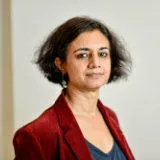Institute Fellows 2025-26
-

Senior Lecturer in Digital Media, Culture and Society
-

Reader in Eighteenth-Century and Romantic Literature
-

Professor of Digital Culture and Society
-

Senior Lecturer in Artificial Intelligence
-

Reader in Data and Society
-

Professor of Economics
-

Senior Lecturer in Defence Studies (Future of Conflict)
-

Professor of Leadership and Organisation
-

Postdoc Researcher
-

Reader in Artificial Intelligence
-

Senior Lecturer in Public International Law
-

Senior Lecturer in Digital Humanities Education
-

Clinical Senior Lecturer in Interdisciplinarity & Innovation Dental Education
-

Lecturer in Neuroscience and Psychology (Education)
-

Honorary Professor
-

Lecturer in Digital Marketing and Communications
-

Vice-Dean (Enterprise and Engagement) and Head of Cybersecurity Group
-

Senior Lecturer in Digital Economy
-

Senior Lecturer in Natural Language Processing
-

Professor of Law & Philosophy
Generative Co-Inquiry: Critical Data Practices with GenAI
Principal Investigator: Dr Liliana Bounegru
Co-Investigator: Dr Oana Cocarascu
This project explores how generative AI can support critical and reflexive engagements with social media data in interdisciplinary research. It aims to develop "critical data practices" by integrating insights from STEM and SHAPE disciplines and collaborating with non-academic partners. The project will review the current use of generative AI in social media research, identifying issues such as misclassification, hallucination, bias, and ambiguity. It will conduct co-inquiries on topics like climate solutions, health misinformation, and ecosystem restoration, focusing on how generative AI can be used for qualitative exploration. The project will contribute to understanding emerging issues around using generative AI for social media research, develop novel research approaches, and critically engage with biases and hierarchies in AI outputs. The outcomes will include new open-source tools and resources to support reflexive use of generative AI in Internet research. This project addresses a rapidly evolving area of AI application, enhancing the understanding of digital cultures and contributing to more thoughtful and imaginative uses of data and generative AI technologies.
Certificate in Environmental Humanities: Culture and Criticism from the Industrial Revolution to the Anthropocene
Principal Investigator: Dr Rowan Boyson
This project proposes an Environmental Humanities certificate, inviting professional learners to examine environmental issues through the lens of literature, philosophy, history and art. The program will feature short courses on topics like ‘Air, Atmosphere and the Right to Breathe’, ‘Ecofeminism and the Idea of Nature’ and ‘Weeds, Seeds, Natives and Invasives: Human Stories of Plants’. These courses will provide students with climate competencies and communication skills, benefiting those in policy, business, the creative economy, and education. Learning outcomes will include insights into the complex ecological relations between humans, nonhumans, history and imagination; recognising the role of arts and humanities – and how to advocate for them – in understanding and tackling environmental problems; and strengthening critical thinking skills.
Centre for Data Sharing
Principal Investigator: Dr Mark Cote
Co-Investigator: Roger Taylor
This project aims to develop a new personal data-sharing model that empowers citizens amidst pervasive computational processes like tracking, targeting, and AI. It is timely due to the increasing intensity of these processes and the opportunity to align the UK with new EU democratic principles in data sharing. The Centre for Data Sharing at King's will provide a UK response to this opportunity. The research will address questions about increasing agency, transparency, and trust in personal data use, legal and regulatory requirements for a new data-sharing paradigm in the UK, and socio-technical requirements for societal impact. The project aims to give users more agency, strengthen consent, and enhance transparency in data processing. The originality of this research lies in creating a UK-based model for democratic data sharing, closely aligned with the EU model and placing humanities researchers at the centre of socio-technical infrastructures. The project will partner with the UK Centre and the European Lab and Observatory, providing seamless access to tools and methods. Societal impact will come from UK communities sharing their data in a safe, transparent, and empowering system. This project is important as it brings more democratic principles to data sharing, enhancing agency, transparency and trust in personal data use.
Digital Pathways to Inclusive Democracies: Addressing Inequality, Identity, and Trust
Principal Investigator: Professor Amrita Dhillon
Co-Investigator: Dr Grammateia Kotsialou
This project explores how economic inequalities, identity politics, and attitudes toward democratic governance shape democratic engagement and trust in institutions. It uses AI-driven analysis and blockchain-based voting systems to enable data-driven economic policy and engage marginalised groups. Key questions include the impact of economic inequalities on trust and participation, the influence of identity on perceptions of inequality, and how digital tools can foster engagement. The project is timely due to the erosion of trust in democratic institutions caused by economic divides and identity tensions. The originality lies in its interdisciplinary approach, combining political economy, sociology, and computer science, and incorporating blockchain and AI solutions. It aims to provide insights into policy impacts and develop digital tools for civic engagement, contributing to more inclusive democratic processes. This project is important as it fosters inclusive democracies, benefiting policymakers, community organisations, marginalised communities, academics, and civil society by enhancing democratic resilience and trust.
Imagining and Contesting Digitalised Futures in Maritime Transport
Principal Investigator: Dr Alex Gould
Co-Investigator: Dr Mercedes Bunz
This project aims to understand how different stakeholders ensure their preferred visions of digital socio-technical futures come to pass and how to intervene for better social outcomes. It uses the transition towards digitalisation and automation in maritime transport as a case study. The project is significant for two main reasons. First, it seeks to provide a comprehensive theory on how power shapes socio-technical transitions, focusing on why certain digital futures are realised over others. Second, it aims to develop strategies for intervening in these transitions to promote better social outcomes. Overall, it will analyse how power works through the processes by which digital and automated technologies are developed, adopted and governed, identifying potential points for intervention beyond regulatory authorities. It will benefit entities campaigning for equality in shipping by providing a framework for understanding and reducing inequities in the making of digital and automated futures in maritime transport.
Imagining, Recognising and Predicting Leadership and Gender through Digitalisation
Principal Investigator: Professor Elisabeth Kelan
Co-Investigator: Dr Helen Yannakoudakis
This project seeks to understand how diversity, particularly gender, can be considered in the development of digital technologies for leadership. It aims to explore how leadership is imagined, recognised, and predicted through digitalisation in relation to intersectional gender. The project will examine how leadership is imagined in relation to digital technologies and gender, how current leaders are recognised with digital tools and the role of gender, and how future leaders are predicted through digital tools and the impact of gender. The project is timely as digital technologies for leadership are currently in development, presenting an opportunity to influence their design for inclusivity. Its originality lies in focusing on the intersection of leadership, digitalisation, and gender, a largely unexplored field. Collaboration with an expert in Natural Language Processing is essential to address complex questions and develop innovative approaches. The project has the potential for broad societal impact by promoting more inclusive digital leadership practices, benefiting organisations, leaders, and employees, and fostering more equitable workplaces.
The Praxis-Belief Continuum: Revealing Customary International Law through AI-assisted Analysis
Principal Investigator: Dr Niccolò Ridi
Co-Investigator: Dr Sanjay Modgil
This pilot project aims to explore how artificial intelligence can revolutionise our understanding of international law formation, focusing on customary international law (CIL). It will leverage AI and machine learning to analyse state practice and opinio juris, integrating diverse sources and creating an open-access platform for CIL analysis. The project addresses key questions about the interaction between state practices and legal arguments, the role of discourse coalitions, and promising AI techniques for large-scale legal text analysis. The research is timely due to the exponential growth of digital information, recent advancements in AI, and the need for greater transparency in international law. It will have significant academic impact by advancing the study of CIL, legal AI, and computational argumentation. The interdisciplinary collaboration between legal scholars and AI experts will enable the development of AI tools that parse legal reasoning nuances and integrate legal theoretical frameworks with computational methodologies. This project will benefit wider society by providing accessible tools for international law analysis, empowering smaller states and researchers, and improving predictability in international relations through a better understanding of customary law formation.
Attention and Perception in XR (XR Literacy Course)
Principal Investigator: Dr Gabriele Salciute Civiliene
Co-Investigator: Dr Maria Elena Stefanou
This project aims to address the skills gap in the rapidly expanding UK immersive sector, which includes Virtual Reality (VR), Augmented Reality (AR), and Mixed Reality (XR) and their entanglements with other technologies such as Artificial Intelligence (AI). Despite the sector's growth and its potential to contribute significantly to the global economy, there is a shortage of workers with the necessary XR literacy skills. This project seeks to raise public awareness of XR's impact on mental and physical health and to provide critical thinking and skills to decode XR through interdisciplinary knowledge from humanities and neuroscience. The courses will teach critical XR literacy skills, benefiting students, staff, and professionals in various fields such as education, entertainment, public services, and cultural heritage. By enhancing understanding and critical engagement with XR technologies, the project aims to improve lives in a technology-saturated world and contribute to social good. This is important as it empowers individuals to navigate and leverage XR technologies responsibly and effectively.
What’s at stake in digital youth & childhoods?
Principal Investigator: Dr Astrid Van den Bossche
This project proposes the development of three short courses leading to a certificate in ‘Digital Youth & Childhoods.’ It aims to explore how digital technologies have reshaped young selves, focusing on safeguarding, digital agency, and ethical design. The courses will examine the relational, cognitive, and material dimensions of children’s digital lives, encouraging participants to question what should be safeguarded and why. The courses will feature a child-centric approach, viewing children as active participants in digital spaces, a historically grounded perspective on digital anxiety and enthusiasm, and a curriculum that foregrounds the question of value in youth digital experiences. Designed for policymakers, industry regulators, NGOs, tech developers, educators, learning designers, and parents, the curriculum will offer an accessible but rigorous exploration of existing research and theoretical perspectives. This project is important as it equips stakeholders with critical skills to navigate and leverage digital technologies responsibly, enhancing the understanding of digital childhoods and contributing to social good.
Game Worker Organising: Analysing labour market dynamics in the global games industry
Principal Investigator: Dr Jamie Woodcock
Co-Investigator: Dr Amanda Coles and Johanna Weststar
This project aims to analyse the dynamics of the labour market and power relations in the global games industry, which has become a strategic sector for investment and regulation. It seeks to understand the impact of unionisation on the industry, combining insights from sociology, political economy, management, and cultural studies. The project builds on the success of the "Game Worker Organizing Summit" in Montréal, Canada, and aims to develop a shared research agenda and funding bid. The project will address key questions about the labour market dynamics, the changing political economy, the role of the state, and the effects of unionisation in different countries. It involves developing a structured research network and co-creating a funding application to the ESRC. The research will contribute significantly to the literature on the games industry, creative industries, and unionisation, benefiting stakeholders like game developers, studios, industry organisations, policymakers, and trade unions. This project is important as it addresses the growing gap in the literature on the games industry and aims to develop policy recommendations and outputs that stakeholders can access and use.
Interdisciplinary Approaches for Uncertain Times
Principal Investigator: Professor Lorenzo Zucca
Co-Investigator: Professor Luca Viganò and Dr Flora Smyth Zahra
This interdisciplinary module aims to prepare professionals to handle uncertainty, particularly with the rapid rise of AI technologies. It integrates insights from legal philosophy, clinical practice, and computer science, offering tools to manage and leverage uncertainty for growth and opportunity. The module includes submodules on uncertainty, interdisciplinary conversations, and security, along with applied workshops to enhance practical skills. Designed to foster critical thinking, cross-disciplinary collaboration, and resilience, the module cultivates students’ ability to approach real-world challenges innovatively and ethically. It benefits a broader audience, including professionals in law, healthcare, technology, and education, by providing them with insights to make sound, ethical decisions. This project equips individuals to navigate and lead effectively amidst uncertainty, contributing to the development of adaptable and insightful future leaders, ultimately enhancing the resilience and adaptability of organizations and communities.
Institute Fellows 2024-25
-

Professor of Ethics and Digital Culture
-

Lecturer in Digital Culture and Creative Computing
-

Professor of Digital Signal Processing
-

Reader in Critical Infrastructure Studies
-

Senior Lecturer in Cybersecurity Education
-

Reader
-

Professor of Computer Science
Biometric Futures
Principal Investigator: Professor Btihaj Ajana
Co-Investigator: Dr Tasmina Islam
Professor Btihaj Ajana’s project “Biometric Futures” explores the use of biometrics in everyday life. Building on her earlier work on biometric governance and self-tracking, the project investigates the rise in personal and governmental use of biometrics and some of the pressing ethical and socio-political issues associated with it. The project is developed in collaboration with Dr Tasmina Islam, Senior Lecturer in Cybersecurity Education.
Engines of Attention: Advanced Computational Modelling of Cinematic Time
Principal Investigator: Dr Daniel Chávez Heras
Co-Investigator: Professor Zoran Cvetkovic
Dr Daniel Chávez Heras’ project “Engines of Attention: Advanced Computational Modelling of Cinematic Time” focuses on machine vision and attention. Developed in collaboration with King’s Digital Lab and Professor Zoran Cvetkovic from the Faculty of Natural, Mathematical & Engineering Sciences, the project builds on Daniel’s recent work on Cinema and Machine Vision to investigate key debates in the history and theory of film through scientific and creative computing, including methods and tools in the fields of signal processing, multi-modal machine learning, and generative AI.
Environmental Intelligences
Principal Investigator: Dr Jonathan Gray
Co-Investigator: Professor Elena Simperl
Dr Jonathan Gray’s project “Environmental Intelligences” in collaboration with Professor Elena Simperl from the Department of Informatics explores how STEM and SHAPE approaches can be combined to critically engage with the histories, politics and possibilities of environmental AI and data practices. It looks into the roles of data and machine learning in knowing and changing environments and investigates how inventive interdisciplinary methods might inspire more equitable and inclusive socio-ecological futures.
Is the Protection of Attention a Human Right?
Principal Investigator: Dr Dan Nicolau
Dr Dan Nicolau’s project “Is the Protection of Attention a Human Right?” explores the impact of social media on attention. The project tests the hypothesis that social media use can cause inflammation, potentially by interfering with attention. In collaboration with the Digital Future Institute’s Centre for Data Futures, Dr Dan Nicolau also explores the potential policy and legislative implications of such a link.
Institute Fellows 2023-24
-

Senior Lecturer in AI Education
-

Professor of Surgery
-

Professor of Artificial Intelligence & Society
-

University for the Creative Arts
-

Lecturer in Digital Innovation
-

Reader in History of Medicine
Dr Anna Maerker was awarded an Education Fellowship to develop educational initiatives examining the relationship between disability and technology. The project included the development of accessible digital courses and collaborative resources for educators in the humanities and social sciences. Additionally, it capitalised on unique resources at King’s, such as the Foyle Rare Books Collection and the Cicely Saunders Archives, to enhance understanding and teaching related to disability and technology.
Dr Brian Kavanagh and his Co-I’s Professor Sally Marlow and Dr Kimberly Goldsmith were awarded a Research Fellowship to develop a project that investigated the role of digital technology in advancing the mission of performing organisations to promote classical music to new and more diverse audience in an era in which attention has become a scarce commodity.
Professor Kate Devlin was successful in her bid (as Co-I) for a five-year, £31m EPSRC-funded multidisciplinary consortium to convene the responsible AI landscape in the UK. RAi UK works with academics, policymakers, industry, and the public to ensure that AI is developed to benefit people, communities and society.